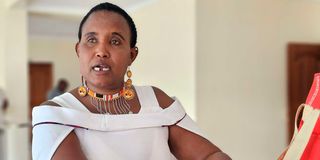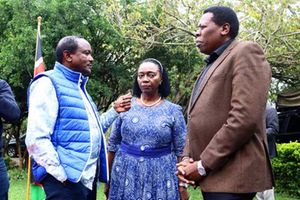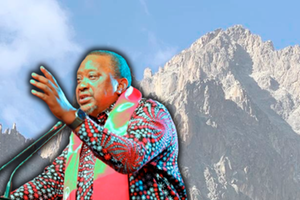How a child mother became Laikipia's beacon of women's empowerment

Mary Metenkus when she spoke to Nation.Africa on October 24, 2024, at a hotel in Machakos County. She was married off at the age of 14, and by the age of 24, she had left her unhappy marriage with four children.
What you need to know:
- Married off at 14 and a mother by 15, Mary Metenkus endured years of violence while brewing illicit liquor to feed her four children.
- With her father's unwavering support and her own determination, she fought to keep her children, rebuilt her life from washing clothes to working as a waitress.
- Today, she stands tall as a respected community leader and land rights champion.
In the heart of Mukogodo West region, where the dust of the Laikipia County roads mingles with the rich aroma of acacia blossoms, lives Mary Metenkus.
The resilient sun cast golden rays across the Kijabe Community Land as she moves through her modest homestead, her spirit as vibrant as the colours of the traditional shuka she wore.
A chairperson of a local women’s group, Mary is no ordinary woman; her life is a testament to strength, shaped by trials that would have left many in despair.
Born under the expansive skies of Kijabe, Mary had never donned the uniform of a schoolgirl, yet she wielded a wealth of knowledge acquired through the stories and struggles shared by other women.
“Life is the greatest teacher,” she often said, her voice steady, “and I have learnt it all from my struggles.”
At the tender age of 14, Mary was swept into the currents of tradition when she was married off to a man far older than herself.
By 15, she was already a mother, giving life to her first child, a mere child herself.
“When I held my son for the first time, I felt the weight of the world on my shoulders,” she recalls, her eyes glistening with a mixture of nostalgia and resolve.
The years flowed on unceremoniously, each bringing another child — her second at 18, a third at 21, and a fourth while still in the grips of marital distress at 24.
It was in 2015, burdened by the weight of her circumstances and with the pregnancy of her fourth born, that Mary made the courageous decision to leave her marriage.
At the time, she was producing illicit liquor to support herself and her children.
The brothers of her husband, insecure and threatened by her burgeoning independence, resorted to violence. They would beat her.
“Enough is enough,” she had whispered to herself, a silent vow echoing in her heart as she fled their grasp.
In the wake of her escape, her father’s unwavering support became her anchor.
“I love my daughter very much,” he declared with fierce conviction, “you cannot mistreat and dehumanise her in such a manner.”
His response resonated like a rallying cry, prompting him to reverse the dowry and allow her to reclaim her dignity.
Yet, the brothers cared naught for dowry; they sought only to keep her children.
Undaunted, Mary stood her ground, her spirit unyielding.
“I must remain with my children,” she insisted, a mother’s love empowering her every word.
With her elder brother’s aid, she sought justice, the local police accompanying them as they marched back to retrieve her children from the clutches of a tyrannical family.
“That,” Mary reflects, “was the end of my marriage, but the beginning of my fight.”
Life was no easier after the fracture of her marriage. Mary juggled the responsibilities of motherhood with haunting uncertainty.
She often found herself in the bustling shopping centres, scrubbing clothes for women who had the privilege of earning an honest wage.
Each penny earned was a lifeline, a means to provide for her four children.
“There was nothing to feed on. No goats, no cows. Nothing,” she recounts with a sense of despair that lingered in her heart, the void of her former life echoing around her.
A turning point came in 2016 when she secured a job as a bar waitress. It was here she encountered another woman who would change her destiny.
“Come with me to a seminar,” this stranger urged, eyes twinkling with the promise of empowerment.
From that moment, Mary’s world began to shift; she was invited to attend meetings in Nairobi, an awakening of purpose that filled her with determination.
A year slipped by, and with newfound knowledge clutched firmly in her hands, Mary returned to her village, where her father had allocated her a plot of land.
Here, she found her voice, not just for herself but for the collective strength of women around her.
“Empowerment begins with knowledge,” she proclaimed at gatherings, her words igniting sparks of courage in the hearts of her peers.
Her journey was not solely about her own sustenance but laid the roots for her children’s futures.
Her firstborn, having achieved incredible academic success with a B+, was now pursuing higher education at university — a privilege sponsored by the very politician Mary had campaigned for.
“Together we rise,” she would often remind the women who rallied behind her, their solidarity echoing through the valleys.
Today, Mary stands tall as a grassroots land rights champion, a beacon of hope in her community.
“Every woman has the power to change the narrative,” she affirms with unwavering conviction.





